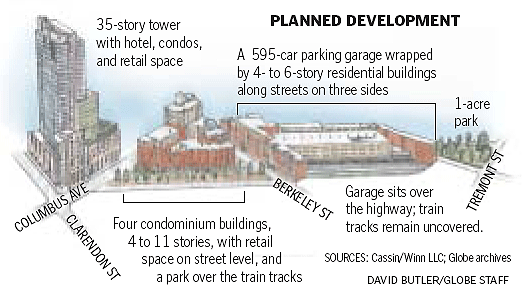philip
New member
- Joined
- May 25, 2006
- Messages
- 81
- Reaction score
- 3
Columbus Center, Boston, MA
This 35-story tower development would take shape on a deck over the Massachusetts Turnpike and would include an upscale hotel, multimillion-dollar condos, parks and an array of neighborhood shops. The $500 million mini-neighborhood would be one of the largest highway air-rights projects ever built in the country.
Status
Approved - Not yet under construction
Architects
cbt architects
Stats
Name: Columbus Center
Project Address: 101 Clarendon Street & 100 Berekley Street
Map & Plan Links: View aerial map (large file) : View plot map
Neighborhood:South End/Bay Village
Uses:Hotel, Retail, Residential, Ownership
Land Sq. Ft.: 44,734 ft
Building Sq. Ft.: 1,302,000 ft
Residential Units: 343
Applicant: Columbus Center Associates
Project Description: 493 residential units w/ 15% affordable (10% on, 5% off), 199 hotel rooms, and 917 parking spaces-over Turnpike Air Rights Parcels 16, 17, 18, 19 Zoning-exempt due to MOU. MOU Determinations approved 7/10/03. Voluntary PDA
Source: Development Projects - Boston Redevelopment Authority
Images







Articles
- Developer Disappointed With Mass Turnpike's Offer, 2006
- Deal Near To Give Columbus Center A Boost, 2006
- Columbus Center Wins Tax Credit Worth Millions, 2006
- South End News - Columbus Center Moves Forward, 2006
- Columbus Center Gets Key Financing, 2006
- Columbus Center Wants $50M in Aid, 2005
- Columbus Center Seeks Public Financing, 2005
- Columbus Center Air Rights Moves Forward, 2003
- Progress? Columbus Center could start in '04, 2003
Links
- Official Columbus Center Condo Website
- Project Information on Boston Redevelopment Authority
- Interactive Graphic of Columbus Center from the Boston Globe
- Columbus Center - archBOSTON Wiki
This 35-story tower development would take shape on a deck over the Massachusetts Turnpike and would include an upscale hotel, multimillion-dollar condos, parks and an array of neighborhood shops. The $500 million mini-neighborhood would be one of the largest highway air-rights projects ever built in the country.
Status
Approved - Not yet under construction
Architects
cbt architects
Stats
Name: Columbus Center
Project Address: 101 Clarendon Street & 100 Berekley Street
Map & Plan Links: View aerial map (large file) : View plot map
Neighborhood:South End/Bay Village
Uses:Hotel, Retail, Residential, Ownership
Land Sq. Ft.: 44,734 ft
Building Sq. Ft.: 1,302,000 ft
Residential Units: 343
Applicant: Columbus Center Associates
Project Description: 493 residential units w/ 15% affordable (10% on, 5% off), 199 hotel rooms, and 917 parking spaces-over Turnpike Air Rights Parcels 16, 17, 18, 19 Zoning-exempt due to MOU. MOU Determinations approved 7/10/03. Voluntary PDA
Source: Development Projects - Boston Redevelopment Authority
Images







Articles
- Developer Disappointed With Mass Turnpike's Offer, 2006
- Deal Near To Give Columbus Center A Boost, 2006
- Columbus Center Wins Tax Credit Worth Millions, 2006
- South End News - Columbus Center Moves Forward, 2006
- Columbus Center Gets Key Financing, 2006
- Columbus Center Wants $50M in Aid, 2005
- Columbus Center Seeks Public Financing, 2005
- Columbus Center Air Rights Moves Forward, 2003
- Progress? Columbus Center could start in '04, 2003
Links
- Official Columbus Center Condo Website
- Project Information on Boston Redevelopment Authority
- Interactive Graphic of Columbus Center from the Boston Globe
- Columbus Center - archBOSTON Wiki


